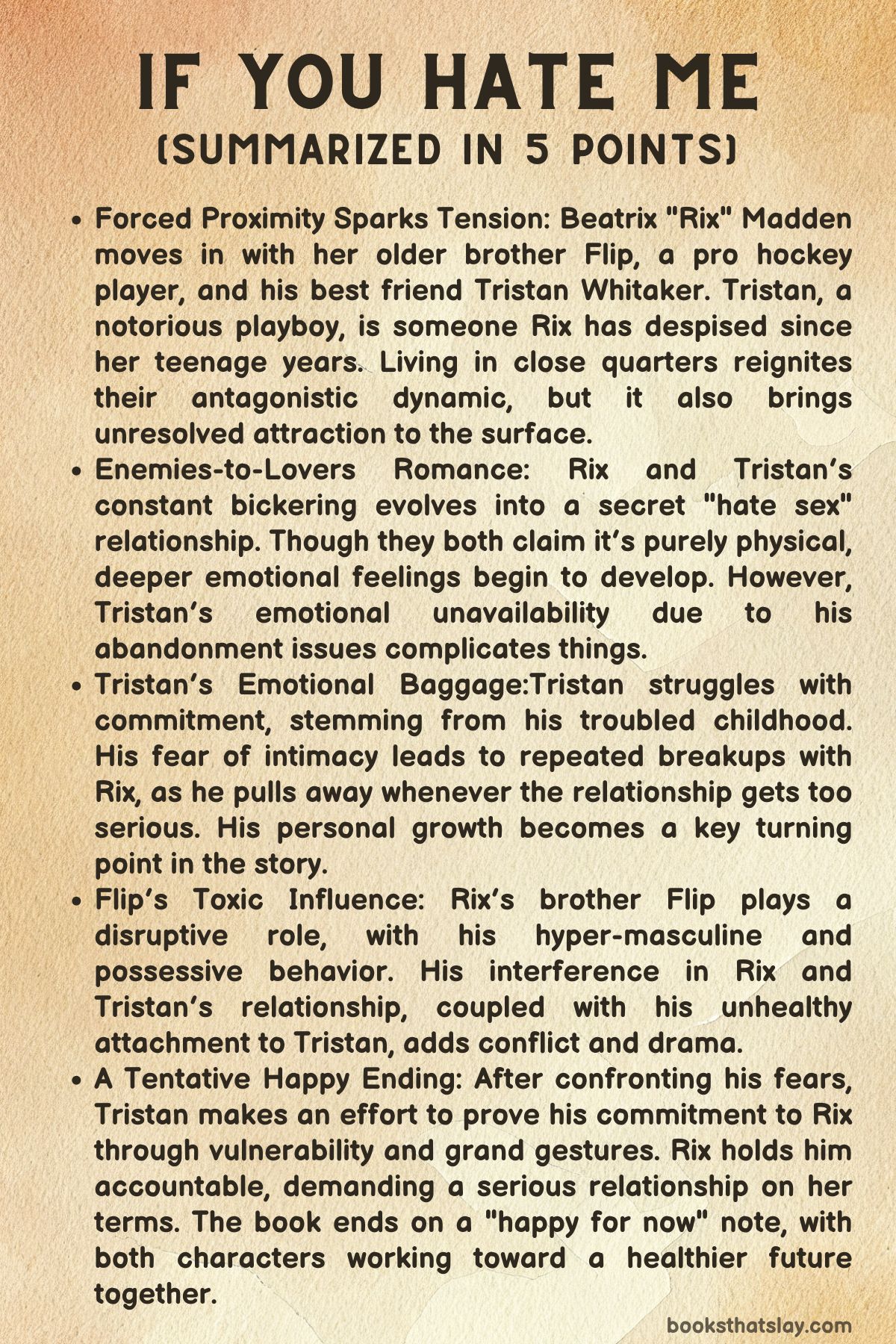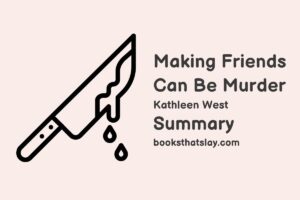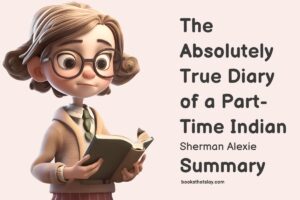If You Hate Me Summary, Characters and Themes
“If You Hate Me” by Helena Hunting is a sizzling, angst-filled hockey romance packed with passion, tension, and emotional growth.
It’s a standalone enemies-to-lovers story that dives into the messy dynamics of forbidden love, with a hefty dose of spice and humor. The book follows Beatrix “Rix” Madden, who reluctantly moves in with her brother Flip and his best friend Tristan, a cocky, emotionally closed-off hockey player she can’t stand—or stop thinking about. Beneath the surface of their heated fights lies undeniable chemistry, but their journey is anything but smooth as past traumas and complicated relationships come to light.
Summary
Beatrix “Rix” Madden is at a crossroads in her life. After impulsively quitting her job and escaping an unbearable roommate situation, she finds herself with no choice but to move into her brother Flip’s apartment.
Flip, a professional hockey player for the Toronto Terror, shares the apartment with his longtime best friend and teammate, Tristan Whitaker—a man Rix has loathed for years.
Despite their shared history of bickering and antagonism, the forced proximity soon rekindles old feelings and ignites new tensions.
Rix and Tristan’s relationship is rocky from the start. Living in the cramped apartment means Rix has little privacy, and Tristan constantly pushes her buttons. He’s infuriatingly cocky, frequently shirtless, and has a well-known reputation as a playboy.
As teenagers, Rix had harbored a crush on him, but now she finds his behavior—especially his penchant for bringing women home—disgusting.
Their fights escalate into pranks and verbal sparring matches, but beneath the hostility lies a simmering attraction they both struggle to ignore.
Despite their antagonism, the tension between them shifts when they enter into a secret, no-strings-attached sexual arrangement.
They justify their hookups as “hate sex,” but the emotional connection brewing beneath the surface tells a different story. Tristan, however, remains emotionally unavailable, haunted by abandonment issues stemming from his troubled childhood.
His mother left him at a young age, leaving him with deep emotional scars that manifest in his inability to commit to meaningful relationships. Instead, he keeps people at a distance with casual hookups and bravado.
As their relationship progresses, Tristan’s emotional baggage starts to create cracks in their fragile connection. His refusal to admit his growing feelings for Rix leads to two breakups—both driven by his fear of intimacy.
The first time, Tristan pulls away to protect himself from getting hurt. The second breakup, however, feels unnecessarily cruel and leaves Rix questioning whether he will ever be capable of loving her the way she deserves.
Complicating matters is Flip, Rix’s brother, who is portrayed as a toxic influence in both Rix and Tristan’s lives.
Flip and Tristan have a history of wild partying and sharing women, a fact that Flip throws in Rix’s face in a shocking confrontation. His jealousy and possessiveness blur the lines of his relationships with both Rix and Tristan, raising uncomfortable questions about his attachment to his best friend.
Flip’s interference causes additional strain on Rix and Tristan’s budding romance, making their path to happiness even more difficult.
Eventually, Tristan begins to confront his emotional issues. He realizes that his past trauma has been holding him back, and he decides to take accountability for his actions.
In an effort to win Rix back, he opens up about his fears and insecurities, showing vulnerability for the first time. His grand gestures and sincere apologies demonstrate his commitment to changing for the better.
Rix, meanwhile, refuses to settle for less than she deserves. She values her independence and knows her worth, demanding that Tristan prove his love through actions, not just words.
Despite the tumultuous ups and downs, their story ends on a hopeful note, with both characters working toward a healthier, more mature relationship. The epilogue hints at a “happy for now” conclusion, leaving readers optimistic about their future together.

Characters
Beatrix “Rix” Madden
Beatrix “Rix” Madden is the central female protagonist who embodies strength, independence, and resilience. She is introduced at a low point in her life after quitting her job and leaving a problematic living situation.
Her decision to move into her brother Flip’s apartment sets the stage for the unfolding drama. Rix is pragmatic and values stability, which clashes with her attraction to Tristan, her brother’s best friend and roommate.
Despite being drawn to Tristan, Rix is wary of his playboy reputation and emotional immaturity. Her inner conflict revolves around balancing her emotional needs with the risk of getting hurt.
Rix’s character arc is about asserting boundaries and self-respect. She refuses to tolerate emotional games and challenges Tristan to confront his trauma before she considers giving him a chance.
Her past crush on Tristan adds layers of vulnerability. However, she doesn’t let her teenage feelings cloud her judgment and holds Tristan accountable for his actions.
Even in moments of vulnerability, Rix remains steadfast in her desire for a meaningful relationship. She values emotional integrity as much as physical attraction, making her a compelling modern heroine.
Tristan Whitaker
Tristan Whitaker is the quintessential flawed romantic hero with deep emotional scars. His character is shaped by a troubled childhood, particularly his abandonment by his mother.
His unresolved trauma causes him to fear intimacy and commitment. As a result, he maintains a superficial playboy persona, using charm and humor to keep others at a distance.
Tristan’s relationship with Rix is marked by tension, as he struggles with his desire for her while fearing emotional vulnerability. His behavior reflects his internal conflict between what he wants and what he believes he deserves.
His character arc involves gradual growth and redemption. Despite his emotional baggage, he eventually acknowledges his mistakes and makes a conscious effort to change for Rix.
Tristan’s transformation is slow and painful, marked by two significant breakups with Rix. His eventual realization that he loves her pushes him to confront his fears and take responsibility for his emotional issues.
By the end of the story, Tristan demonstrates that he is ready to move past his trauma. He shows vulnerability and makes genuine efforts to be a better partner for Rix.
Philip “Flip” Madden
Philip “Flip” Madden is Rix’s older brother and a professional hockey player. His character is defined by his hyper-masculinity, crudeness, and selfishness.
Flip’s behavior is often unsettling, particularly his tendency to engage in wild sexual escapades with his teammates, including Tristan. He has little regard for boundaries, which creates significant conflict in the story.
His overprotectiveness toward Rix comes across as possessive and controlling. He refuses to respect her autonomy and interferes in her relationship with Tristan.
Flip’s attachment to Tristan borders on obsession. His jealousy and possessiveness over both Rix and Tristan suggest deeper, more complex emotions.
One of the most controversial scenes involving Flip is his graphic confrontation with Rix. He disturbingly describes his shared sexual experiences with Tristan, making it clear that he struggles to separate his relationships.
Despite his toxic behavior, Flip’s motivations are not entirely villainous. He cares for both his sister and Tristan, but his misguided attempts to protect them cause more harm than good.
Flip represents the dangers of unchecked toxic masculinity. His actions serve as a cautionary example of how unhealthy attachments and controlling behavior can damage relationships.
Themes
The Complex Dynamics of the Brother’s Best Friend Relationship
One of the most prominent themes in If You Hate Me is the complex dynamic between the protagonist, Rix, and Tristan, who is her brother Flip’s childhood best friend. The tension between Rix and Tristan is compounded by their shared history and their forbidden relationship.
Tristan, as Flip’s best friend, has always been a constant presence in Rix’s life, but their bond has been one of constant antagonism. For Rix, the situation is fraught with discomfort, as she is forced to confront her teenage crush on Tristan, now grown into a playboy.
This theme highlights the difficulty of navigating a relationship that is not only taboo due to Tristan’s friendship with Flip but also challenged by past interactions that have molded their perceptions of each other. Their growing feelings for one another become even more complicated by the proximity they share as roommates, adding further tension to an already strained situation.
The Psychological Struggles of Emotional Immaturity and Fear of Intimacy
A critical theme explored throughout the novel is the emotional immaturity and fear of intimacy exhibited by Tristan. His unresolved trauma stemming from his mother’s abandonment in childhood manifests in his reluctance to form genuine, lasting connections with others.
Tristan’s emotional baggage complicates his relationship with Rix, as his inability to be vulnerable or open up emotionally leads to a cycle of temporary hookups and avoidance of commitment. His actions, such as using casual sex to shield himself from emotional pain, reflect a deep-seated fear of rejection and the possibility of getting hurt.
His repeated breakups with Rix—despite their undeniable chemistry—serve as emotional walls that he constructs to keep himself from fully engaging in the relationship. His journey toward self-awareness and emotional growth is a central conflict, with his eventual realization of how deeply he cares for Rix marking a turning point in the narrative.
The Impact of Toxic Masculinity and Sibling Rivalry in Shaping Relationship Boundaries
Toxic masculinity and sibling rivalry are key themes that shape the course of Rix and Tristan’s relationship. Flip, Rix’s older brother, embodies a hyper-masculine, crude personality that revolves around promiscuity, and his blatant disregard for Rix’s boundaries reflects the influence of toxic masculinity.
His relationship with Tristan complicates matters even further, as the two men share not only a friendship but also an unhealthy bond of sexual entitlement. Flip’s behavior toward Rix is controlling and possessive, particularly when he discovers the relationship between Rix and Tristan.
His graphic description of past sexual encounters with Tristan, involving shared partners, exemplifies his obsession with both his friend and his sister in a disturbingly unhealthy manner. The friction between Rix, Tristan, and Flip highlights how familial relationships, especially those influenced by toxic masculinity and sibling rivalry, can create significant barriers in romantic and personal development.
Navigating Personal Independence and the Struggle for Emotional Autonomy in a Complicated Romance
Rix’s journey in the novel is not just one of romance but also a quest for personal independence and emotional autonomy. Having left her previous job in frustration and dealing with the chaos of living in a shared apartment with Tristan and Flip, Rix is at a low point in her life.
She is determined to regain control over her own destiny, which includes finding a new job and a new place to live. Her desire for independence is juxtaposed with the complexities of her growing feelings for Tristan, a man who remains emotionally unavailable for much of their relationship.
Rix’s struggle lies in reconciling her need for a meaningful connection with her refusal to compromise her emotional autonomy. She insists on not being treated as a second choice or fallback option, demanding that Tristan prove his commitment.
The Exploration of Unconventional and Explicit Sexual Encounters as a Reflection of the Characters’ Emotional Disconnect
The novel is also marked by a series of unconventional and explicit sexual encounters, which serve as a reflection of the characters’ emotional disconnect. The relationship between Tristan and Rix begins with “hate sex,” which is initially a way for both to channel their frustration and sexual attraction into physical encounters devoid of emotional attachment.
These highly explicit and sometimes controversial scenes—including the infamous cucumber incident—serve not only to heat up the narrative but also to reflect the characters’ emotional struggles. Tristan’s reluctance to open up emotionally results in the physical relationship becoming an outlet for both of them, where raw emotions manifest in intense sexual encounters.
This theme of using physical intimacy as a substitute for emotional closeness underscores the tension in their relationship, as they both grapple with their past traumas and fears of vulnerability.
Overcoming Past Trauma and Building Trust for a Healthy Relationship
A crucial theme in the story is the journey of healing, both for Tristan and Rix, as they work through their emotional issues and attempt to build a healthy relationship. Tristan’s past trauma—stemming from his mother’s abandonment—is a major factor in his inability to trust or commit to anyone, including Rix.
This trauma drives much of his self-destructive behavior and his emotional immaturity. Throughout the novel, Tristan’s internal struggle to break free from the shadows of his past becomes a key point in his character development.
As he begins to confront his unresolved issues, he makes an effort to prove to Rix that he is capable of emotional growth and genuine commitment. For Rix, healing comes from setting clear boundaries and learning to assert her own emotional needs, demanding that Tristan meet her halfway.
The eventual reconciliation between the two characters is not an easy one, but it signals their willingness to work through their emotional scars and build a future together, suggesting that healing is possible with effort and understanding.


